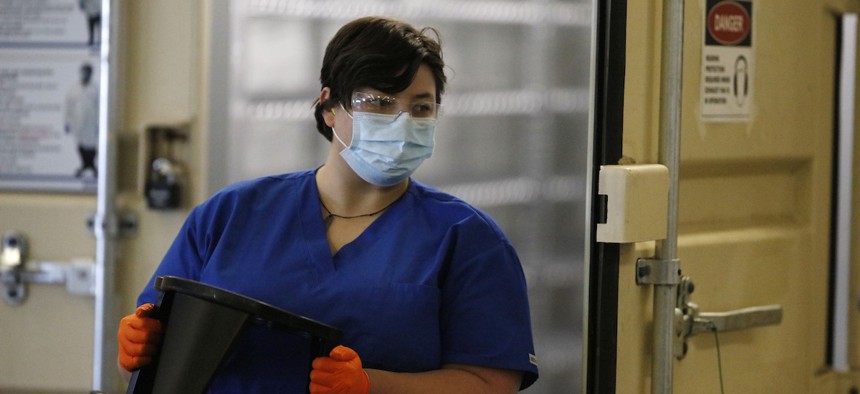Decontamination Systems Can Rejuvenate First Responders' Masks

A worker carries a foot stool out of a Battelle N95 mask decontamination system on Friday, May 8, 2020, in Henderson, Colo. The state has received two of the cleaning units. Associated Press
The systems, which are being deployed across the country, can disinfect up to 80,000 N95 masks per day, allowing each to be reused up to 20 times.
Sixty systems that can decontaminate thousands of N95 surgical masks of the coronavirus each day are being deployed in cities across the country for health-care providers and first responders to use for free, federal officials announced this month.
The Battelle Memorial Institute Critical Care Decontamination Systems, procured through a $415 million contract with the Defense Department, can decontaminate up to 80,000 masks per day, allowing each to be reused up to 20 times. The systems, distributed by FEMA and the U.S. Department of Health and Human Services, are already up and running in a handful of cities, including New York, Boston, Chicago; Tacoma, Washington; Columbus, Ohio and Idaho Falls, Idaho.
Locations were selected based on their proximity to state borders and major metropolitan areas, giving first responders in other locations the option to send in their used masks to be decontaminated and returned quickly. Colorado, for example, has one system in Montrose, on the southwestern side of the state, and a second in Denver, in the northeastern corner.
“We have another location in Denver, at the Adams County Fairgrounds, so if it’s closer for them to ship there, they can do that,” Laura Aume, the decontamination site leader in Montrose, said in a TV interview. “We can take masks here on the western slope, and also from the adjacent states, where we might be closer than other locations.”
Shipping is free for most agencies, including Veterans Affairs hospitals and clinics, first responders, law enforcement agencies and skilled nursing facilities (providers begin by filling out an enrollment form to request service). Before being shipped to a decontamination facility, masks should be clean (no mucus, blood, makeup or dirt) and placed in a plastic bag. The bag should be tied off when it’s full, then placed in a second bag that’s then wiped down with disinfectant.
The system decontaminates masks by exposing them to concentrated vapor-phase hydrogen peroxide for two and a half hours, which eliminates “biological contaminants, including SARS-CoV-2," the virus that causes Covid-19, the company said.
At full capacity, the 60 stations nationwide can decontaminate 4.8 million masks per day, or nearly 34 million per week. Officials are hopeful that’s enough to help health-care workers and first responders replenish their supplies of surgical masks until the supply chain for new equipment can meet the increased demand.
“Our front-line workers are in need of these critical PPE supplies, and we are doing everything we can to supply them with the tools to effectively do their jobs while preventing further spread,” Wisconsin Gov. Tony Evers said in a statement. “I encourage all of our frontline workers to save their N95 respirators so they can be decontaminated.”
Kate Elizabeth Queram is a Staff Correspondent for Route Fifty and is based in Washington, D.C.
NEXT STORY: Militias Direct Coronavirus Anger at State and Local Governments





